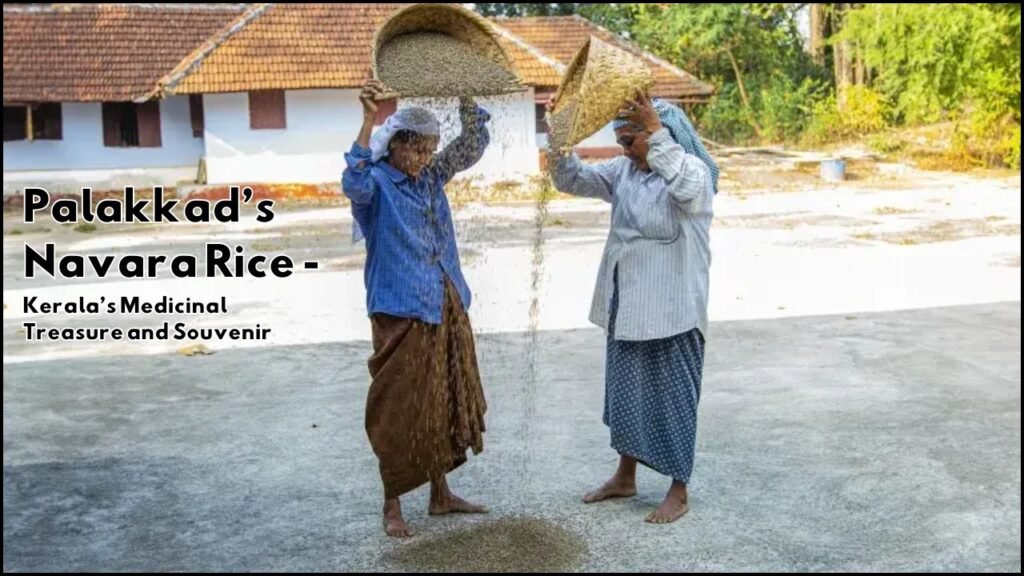
Navara rice, a rare and ancient grain, grows mainly in the fertile fields of Palakkad, Kerala. This traditional rice variety holds both medicinal and cultural value. Unlike other types of rice, Navara is cultivated on a smaller scale and treated with utmost care by farmers who carry forward centuries-old agricultural knowledge. Known for its healing properties and deep connection with Kerala’s heritage, Navara rice is not just food but a symbol of identity and wellness.
Origin and Cultivation
- Region of Growth: Palakkad district in Kerala, especially in the wetlands and paddy fields of Chittur taluk.
- Soil Type: Clay-rich, alluvial soil found near riverbanks.
- Climate Requirements: Warm, humid climate with moderate rainfall.
- Cultivation Method: Traditional organic farming techniques have been passed down through generations.
- Harvest Period: Short-duration crop harvested within 60 to 90 days, depending on the variety.
Unique Characteristics of Navara Rice
- Botanical Classification: Belongs to the genus Oryza sativa.
- Grain Color: Ranges from golden yellow to reddish-brown.
- Grain Size and Texture: Smaller, slender grains with a slightly rough texture.
- Taste Profile: Slightly nutty and earthy flavor.
- Cooking Time: Requires more time to cook compared to polished white rice.
- Shelf Life: Longer shelf life due to low moisture content when stored properly.
Medicinal Benefits
- Ayurvedic Significance:
Navara rice has been used in Ayurvedic treatments for over 2000 years. - Health Benefits:
- Respiratory disorders: Helps relieve symptoms of asthma and bronchitis.
- Digestive issues: Eases indigestion and strengthens gut health.
- Anemia: High iron content helps in improving hemoglobin levels.
- Nervous disorders: Nourishes nerve tissues and aids recovery.
- Low immunity: Strengthens the immune system with antioxidants.
- Joint pain and arthritis: Acts as an anti-inflammatory food for joint-related problems.
- External Use in Treatments:
Used in “Navarakizhi”, a type of Ayurvedic massage where cooked Navara is bundled in cloth and used for body treatments.
Cultural and Religious Significance
- Role in Rituals: Navara is offered in temples and used during special poojas.
- In Traditional Festivals: Present in harvest celebrations and feasts, showcasing its sacred status.
- Symbol of Heritage: Represents Kerala’s connection to ancient farming and spiritual traditions.
Economic and Social Impact
- Livelihood for Farmers: Provides income for many small-scale farmers in Palakkad.
- Women’s Empowerment: Women play a key role in processing and packaging Navara rice.
- Market Value: Commands a higher price than regular rice due to its medicinal properties and rarity.
- Support from Institutions: Kerala Agricultural University and Navara Eco Farm support sustainable cultivation.
Processing and Usage
- Post-Harvest Processing:
- Cleaning: Removal of husk, dust, and unwanted particles.
- Boiling/Parboiling: Enhances nutritional value and shelf life.
- Drying: Done in the sun using traditional methods.
- Packaging: Eco-friendly jute or cloth bags to preserve aroma and nutrients.
- Culinary Uses:
- Used to make Navara Kanji (a rice porridge for patients).
- Cooked with milk and jaggery for Navara Payasam (a sweet dish).
- Ground into flour for baking or preparing therapeutic drinks.
Navara as a Souvenir
- Popular Gift Item: Bought by tourists as a healthy and meaningful souvenir from Kerala.
- Availability: Sold in Ayurvedic shops, organic stores, and online platforms.
- Eco-Friendly Packaging: Often wrapped in traditional cotton cloth or handmade boxes.
- Cultural Value for Tourists: Carries the story of Kerala’s farming, healing, and tradition.
Geographical Indication (GI) Tag
- Year of GI Tag: 2007
- Importance of GI Tag: Protects the identity of Navara rice and ensures it is grown authentically in Palakkad.
- Impact of GI Tag: Increases market demand and export value while preserving traditional practices.
Challenges in Cultivation
- Low Yield: Produces less grain per acre compared to high-yield commercial varieties.
- Labour Intensive: Requires manual planting and harvesting due to fragile plant structure.
- Climate Sensitivity: Susceptible to changes in rainfall and temperature.
- Limited Awareness: Consumers are often unaware of its health value and uniqueness.
Support and Promotion
- Government Initiatives: Subsidies and training for organic farming practices.
- NGO Involvement: Organizations help in marketing and educating farmers.
- Agro-Tourism: Visitors can explore the Navara farms and learn about their cultivation.
- Navara Eco Farm: Promotes sustainable farming and allows direct purchase from farmers.
Final Analysis
Navara rice from Palakkad is more than just a grain; it is a heritage crop rich in healing properties, cultural importance, and economic potential. By supporting its cultivation and spreading awareness, consumers and travelers alike help preserve a tradition that nourishes both the body and the spirit. This golden rice truly reflects Kerala’s deep-rooted relationship with nature and health.